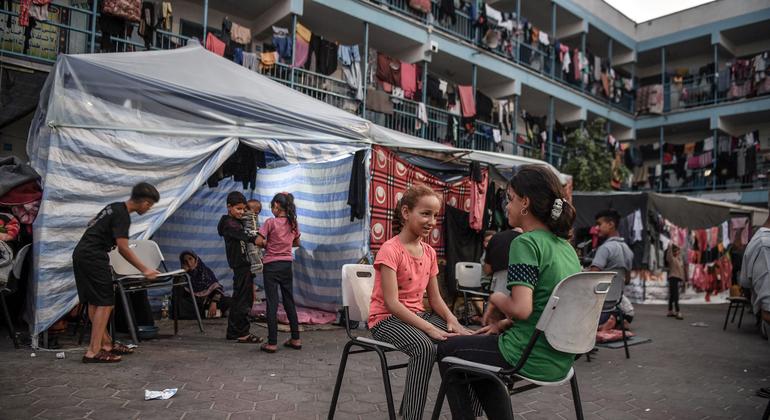Women and children are bearing the brunt in terms of deaths and injuries as Israeli troops battle Palestinian militants across the enclave, with nowhere safe to go, and aid distribution stymied by war, insufficient access and insufficient supplies crossing into the Strip.
Adele Khodr, UNICEF Regional Director for the Middle East and North Africa, said in a statement on Saturday that Gaza was “the most dangerous place in the world to be a child…Entire neighbourhoods, where children used to play and go to school have been turned into stacks of rubble, with no life in them.”
Staff from the UN children’s agency report that close to one million children have now been forcibly displaced since the cycle of violence began on 7 October.
“They are now being pushed further and further south into tiny, overcrowded areas without water, food, or protection, putting them at increased risk of respiratory infections and waterborne disease”, warned Ms. Khodr.
“The restrictions and challenges being placed on the delivery of lifesaving aid going into and across the Gaza Strip are another death sentence for children”, she added.
She said the whole humanitarian system is buckling, particularly under the extreme strain caused by the measures imposed by Israel as it’s offensive continues.
“An immediate, long-lasting humanitarian ceasefire is the only way to end the killing and injuring of children”, she said.
On Friday, the United States vetoed a Security Council resolution calling for a ceasefire, arguing that ending the fighting now would just leave Hamas in place, which is “a recipe for disaster”, according to the US Ambassador Robert Wood.
Guatemala: UN chief ‘alarmed’ at top prosecutor’s office attempt to annul general election result
The UN Secretary-General said in a statement released on Friday night that he was alarmed at the attempt by Guatemala’s attorney general’s office to annul the general election result and prevent President-elect Bernardo Aravelo from taking office in January.
In the statement issued by his Spokesperson, UN chief António Guterres pointed out the top elections tribunal had certified Mr. Aravelo’s landslide victory at the polls in late August.
According to news reports, his centre-left Seed Movement party has faced several investigations from prosecutors who has alleged past party registration and voting irregularities.
Mr. Aravelo reportedly referred to prosecutors’ investigations as an “attempted coup”, designed to prevent his taking office on 14 January. The top electoral court said the results must stand, and the outgoing Government reportedly issued a statement late on Friday saying the transition of power to Mr. Aravelo was inevitable.
“The Secretary-General reiterates his call for the respect of the will of the Guatemalan voters and for a smooth transition of power in January”, said UN Spokesperson Stéphane Dujarric.
“The Secretary-General trusts that the results of the election as certified by the Supreme Electoral Tribunal will be respected.”
‘Extremely disturbing’
Supporting that view, the UN human rights chief Volker Türk said the move on Friday by the attorney general’s office to annul the transfer of power was “extremely disturbing.”
He stressed that judicial harassment and intimidation against electoral officers and elected officials was unacceptable.
“It is encouraging that, despite the long list of judicial and political actions taken by some authorities, which clearly undermine the integrity of the electoral process and breach the rule of law and democracy, people have been standing up for their rights and have been opposing what they perceive as a theft of their political will,” the High Commissioner added.
Threat of genocide ‘an enduring menace’: Guterres
In his message on Saturday marking the international day for victims of genocide, UN Secretary-General António Guterres said that a new global push is needed to ensure that “never again” should anybody have to live through the horror.
“Sadly, we are in danger of forgetting the dark lessons of the past. In today’s world of deep division, mistrust and conflict, we remain confronted by the enduring menace of this atrocious crime”, he said.
He said it was essential that the Genocide Convention, which codified the crime for the first time this day, 75 years ago, when the General Assembly adopted it, “must remain a living force in our world, calling us to uphold its solemn promise.”
He said keeping the promise made by the 153 parties to the convention, which became effective in 1951, requires all governments ratifying and fully implementing the Convention and ensuring that perpetrators are held to account.
“It requires a renewed global push to establish and strengthen prevention mechanisms, educate new generations about past genocides and counter mis- and disinformation, which can fuel hate speech and genocidal intent and action”, said the UN chief.
As allegations of genocide continue to be make by all parties together with supporters around the world, in the context of the current war in Gaza between Israel and Palestinian militants, take a look back below at the history of the crime, and the extraordinary work of lawyer Raphael Lemkin who brought the convention against genocide to life – the UN’s first ever human rights treaty.


